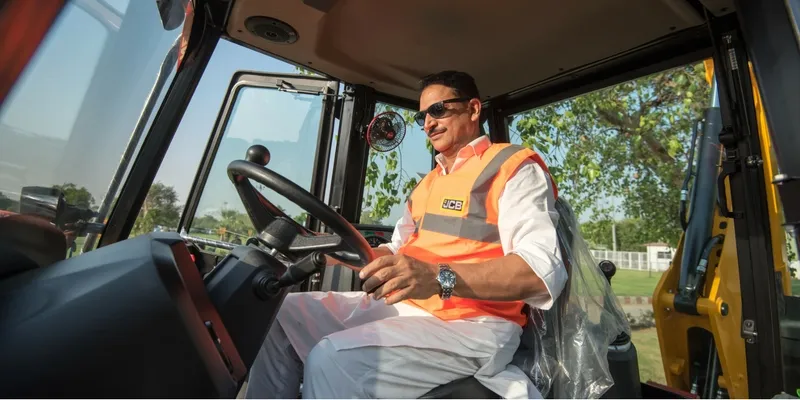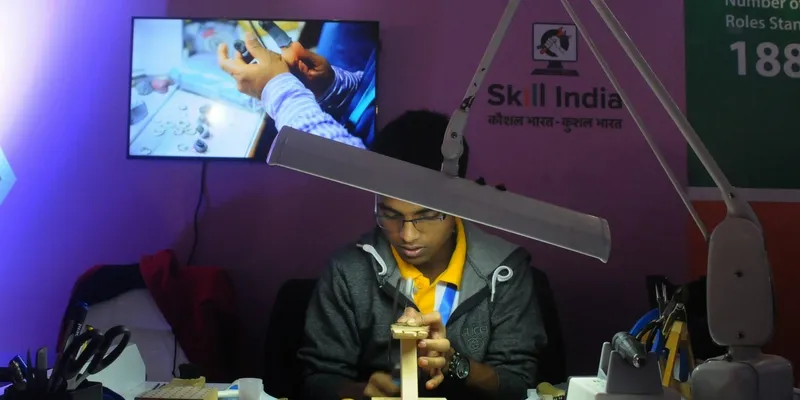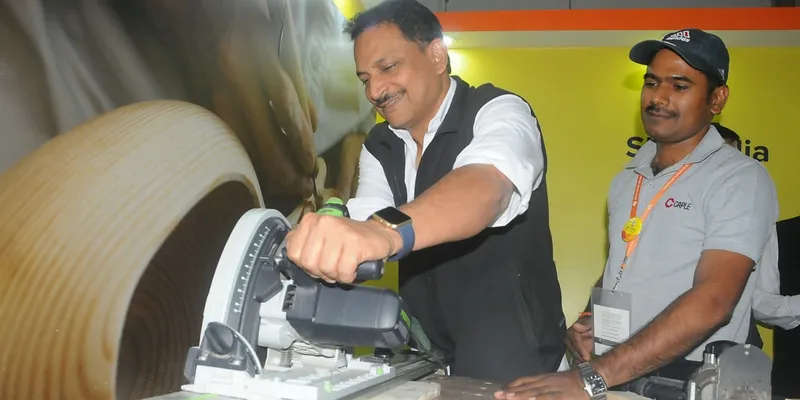Exclusive: Rajiv Pratap Rudy on how Skill India mission aims to make us the skill capital of the world
With millions of jobs seekers entering the market every year, can Skill India Programme become the answer for unemployment? In an exclusive interview with YourStory, Rajiv Pratap Rudy, Minister of State (Independent Charge) for Skill Development and Entrepreneurship, reasons out the need for the Skill India Programme. The minister talks about the nitty-gritty of Skill India—how the scheme accommodates the needs of the whole nation and the how it will overcome the challenges of automation.
What was the main aim of the Skill India Programme?
With increasing globalisation, knowledge and competition, there is a need for highly skilled workforce in both developing and developed nations. Prime Minister Narendra Modi came up with the Skill India Programme to make India the skill capital of the world and to provide the youth of the country with better means of livelihood.

Along with this was launched the National Skill Development and Entrepreneurship Policy in the year 2015 by the Ministry of Skill Development and Entrepreneurship (MSDE). It clearly stated the challenges faced by the country with regard to skill gap across industries. It has been identified that 104.62 million fresh entrants to the workforce, over next seven years (by 2022), will need to be skilled. Additionally, 298.25 million of existing farm and non-farm sector workforce will also need to be skilled again.
As we all know, India is a young nation and Skill India Programme plans to create opportunities, space and scope for the development of the talents of Indian youth in various sectors across India. It aspires to achieve this by bringing in convergence and coordination amongst all entities working towards one common goal.
The main emphasis is to equip the young workforce with employable skills and provide them with entrepreneurship opportunities. The government also focuses on providing quality training to youths with the latest technology applications. Various schemes/initiatives have been proposed to achieve this objective.
With millions of new job seekers entering the job market every year, skill development has become one of India’s desperate needs. How does the ministry plan to cope up with it?
Well, we have kept in mind the huge size of the country and its diversities in terms of demography, geography, industry spread, etc. Any countrywide scheme requires an orientation that seeks regional balance.

Our schemes such as the Pradhan Mantri Kaushal Vikas Yojana (PMKVY) deal with the very sensitive issue of livelihood and employment. We cannot allow a compromise in the quality of skilling as it can dilute the purpose of the scheme.
While skill gap studies have been conducted by KPMG, there is the need to identify the requirement for skilled workforce across sectors and states. In larger public interest, it is important that training centres are distributed across the country and across sectors so that training and employment opportunities are generated across geographies. In addition, reviews are conducted towards a demand-driven model to ensure that trained workforce is not unemployed due to uneven distribution of training across various sectors and geographies.
A continuous monitoring process has been set up so that quality is maintained in the ecosystem. We are also moving towards a more digitised/online examination system. A performance grading system is under implementation for ITIs and our training centres under short-term skilling are led by National Skill Development Corporation (NSDC). The course curriculum has been re-designed as per the current industry requirement. The idea is to build on the strengths and tighten the loopholes for a focused outcome through the Skill India Programme.
We have expanded our capacity network across geographies for new job seekers and are also creating industry linkages for them.
There are as many as 200 PMKK in 28 States which are already functional and providing skill-based training. This number will increase to 556 centres across 514 districts. There are more than 13,000 ITIs today in both government and private set-up which are being modernised and upgraded to institutes of great standards and technical support.
There will be 100 centres with courses on Yoga and 100 centres with the GST practitioners’ course. These have been introduced under Skill India Programme in line with the latest the latest reforms the country has experienced.
There are project institutes, schools, ITIs and entrepreneurship development centres which are being empanelled for promoting entrepreneurship under Skill India in the country. MSDE also plans to open Driver Training Institutes (DTI) and India International Centres (IISCs) to cater to the demand for drivers in the country and train students exploring global mobility, respectively.
So, we have certainly scaled up the programme by leaps and bounds and all endeavours are directed towards ensuring that people do not have to migrate from their hometowns for courses and jobs.
How has the programme fared? Please share the implementation rate.
Now that skills have formally been recognised under the Skill India Programme after 70 years of independence, we are quite on the right track to achieve the vision of our Prime Minister Shri Narendra Modi. The centre has allocated more than Rs 12,000 crore to the Pradhan Mantri Kaushal Vikas Yojana (PMKVY) to provide skill-training avenues to youth who cannot afford to pay for their training. It aims to mobilise them to undertake industry-relevant skills.
More than 1.17 crore people have been skilled under various programmes propagated by the MSDE under the Skill India mission till now.

More than 28 lakh candidates have been trained under Pradhan Mantri Kaushal Vikas Yojana and another 38 lakh candidates through our ITI ecosystem.Around 4.62 lakh were trained under the Recognition for Prior Learning (RPL) programme where individuals are given recognition for the skills they have acquired over the years through on field training or family legacy. Under our recently introduced National Apprenticeship Promotion Scheme (NAPS), we have more than six lakh candidates engaged in the industry.
We are going beyond our mission to skill people and have taken multiple initiatives to ensure linkages to jobs, whether it is through rozgar melas (job fairs) or shop floor training. We have also mandated our training partners under short-term training through National Skill Development Corporation to ensure at least 70 percent placement.
What are the roadblocks faced by your team during the implementation phase?
Again, skills have formally been recognised now with the inception of Skill India Programme. It has brought in convergence and coordination across all skill development initiatives being run across the country. For the first time ever, a ministry has been formed to ensure a robust ecosystem with outcome-based skill courses that will certainly contribute to the country's economic growth.
Our most important and conscious effort is towards making everyone respect and aspire for skills so that they aren’t considered just another added course to one’s resume. People must realise that the value is in the work one does and not just in what one learns.
As children, we were always told to do things with our hands whether it was building castles on the beach or building houses with blocks. But as we grow to become adults, we get conditioned by our environment and the education we get. We all know that applied knowledge is the most relevant knowledge to gain. Skills are getting due respect and parents can see the transformation skill development is bringing in the lives of their children.
The other important aspect here was to bring skills under one common framework for the implementation of common norms. There were multiple ministries running multiple schemes (20 ministries – 70 schemes) and then in 2015, MSDE was conceived. Our efforts have been directed towards bringing skilling under a single umbrella and reducing the multiplicity of agencies involved. For example, the DGT was transferred to us by the Ministry of Labour.

Automation will become a big problem in the near future with robots and machines taking up jobs. How does the ministry plan to deal with automation?
In today’s scenario, with so many uncertainties with regard to jobs, it has become imperative to constantly skill, upskill and reskill oneself to be relevant and ensure retention of the jobs being pursued. Presently, there exists a massive gap between the demands of industry and the skill level of the youth. A sustainable skilling ecosystem is needed to produce a globally competitive workforce which can stay ahead of automation and industry challenges.
To cope up with this constant change, we are constantly reviewing various skills which are required by our candidates to sustain in the job market. There is a requirement for multi-skilled talent. Today a security guard doubles up as a receptionist as well. They should also have basic entrepreneurial skills to self-sustain themselves. We have thus ensured that a mandatory module on entrepreneurship is included in each and every course.\
Read More:
Govt marks one year of Skill India by launching 15 centres for youth training
92pc of India’s engineers are unemployable, Tweak Skills plans to change that







